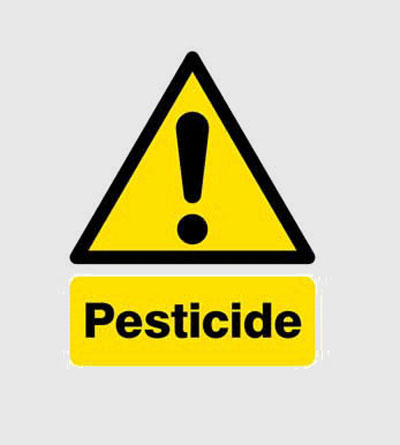 Dr Cletus Agbatu, a research fellow at the Victorian Department of Health and Pesticides, London, on Wednesday cautioned against the persistent use of pesticides to reduce the negative effects on health.
Dr Cletus Agbatu, a research fellow at the Victorian Department of Health and Pesticides, London, on Wednesday cautioned against the persistent use of pesticides to reduce the negative effects on health.
Agbatu gave this advice in an interview with the News Agency of Nigeria (NAN) in Lagos.
According to him, pesticides are used to control insects like cockroaches, mosquitoes, butterflies, worms, fleas and flies or rodents like rats and mice.
He said: “Pesticides are chemicals designed to kill or harm pests and they include insecticides used for insect control, herbicides for weed control, and rodenticides used for rodent control.
“These are toxic and if used carelessly, they may affect the health of user, family, pets or the environment.
“Nowadays, they are indiscriminately purchased from supermarkets, stores and hawkers.
“While pesticides are important in the management and control of spread of diseases, they should not be used carelessly.’’
Agbatu, also the Chief Executive Officer, Tropics Care International, Maryland, Lagos, identified some of the risks associated with the indiscriminate use of pesticide to include poisoning, breathing challenges, allergies, skin reactions, vomiting and cancer.
He said that persistent use could also result to loss in coordination, reduced speed of response to stimuli, reduced visibility, memory loss, motor skills, increased irritable behaviour and hormone disruption.
According to him, cancer can develop from little contact with chemicals from pesticides and with cancer cells needing only little exposure to chemicals, they will grow on their own.
He said that pesticides poisoning could also be passed to pregnant women and unborn babies, as well as to elderly people who might not be able to withstand the gases from pesticides.
“More severe poisoning may also lead to changes in heart rate, neurological diseases, thoracic infections, chest tightness, muscle weakness and twitching, difficulty in breathing, walking, constricted pupils and incontinence.
“In very severe cases of poisoning, seizures and unconsciousness may occur.
“Symptoms of acute poisoning from pesticides may begin shortly after exposure and may include headache, dizziness, nausea, stomach cramps, excessive saliva, sweating and diarrhoea,’’ he warned.
Agbatu said that harmful pesticides could enter the body through direct intake or consumption of foods and drinks that have been exposed to pesticides.
“Pesticides can also enter the body via skin contact through pesticide soaked clothing, touching pesticides treated surfaces, inhaling the substance or through contact with the eyes.
“Poisoning by exposure to pesticides may occur shortly after a single exposure, we see it as acute poisoning, or gradually, after repeated exposures over a period of time, we term it as chronic poisoning.
“So, it is advisable for one to minimise frequency of exposure and take care when in contact with pesticides, to reduce the chances of damage to health.
“In Nigeria, like most countries in the tropics, the rate of pests’ reproduction is high, so it is advisable to hire an authorised pest control operator when pest challenges cannot be personally managed,’’ the expert advised.
According to Agbatu, before purchasing pesticides, people must first consider whether the use of pesticide is appropriate and make sure the pesticide chosen is designed for the pests intended to control.
He said that it was not realistic to expect a completely pest free environment, because repeated use of pesticides could be more dangerous in the long term than the pests themselves.
“People must also consider non-chemical pest control measures as alternates to chemical which is more harmful or go for the least toxic household pesticide available.
“The option of using traps can be explored, but should not be laid in areas where children, pets or native animals can be harmed.
“Another great alternative to the persistent use of pesticides, which is also effective in combating pests is keeping the environment clean.
“Food scraps should be disposed properly in the trash can with a lid, gutters should be cleared of leaves and other debris that may collect water and outside fumigation can be practised.
“Plants and flowers should be regularly trimmed and cracks on the walls should be sealed,’’ Agbatu counselled.



